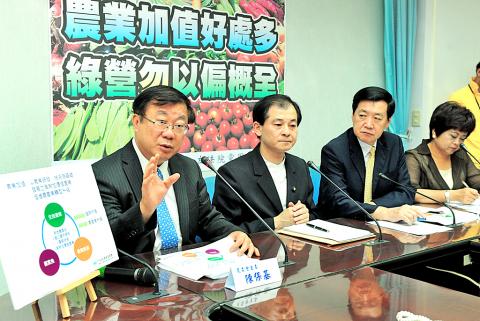The government’s free economic pilot zone policy is not simply about lifting the ban on 830 Chinese agricultural products, but is aimed at broadening Taiwan’s global reach, Council of Agriculture Minister Chen Bao-ji (陳保基) said yesterday.
With the legislature expected to review the draft bill on the pilot zones during the last week of the three-week-long legislative extraordinary session, Chen, accompanied by Chinese Nationalist Party (KMT) legislators, called on the public and opposition lawmakers to support the policy.
Chen described the bill as a far-seeing policy aimed at enabling “Taiwan’s [food] processing techniques to shine” on the global stage.

Photo: Lo Pei-der, Taipei Times
The draft bill’s Article 42 has long been the target of criticism by civic groups and opposition parties, which contend that it would allow the import of currently banned Chinese agricultural products to the pilot zones for processing and be exported with the label “Made in Taiwan.”
Chen said that imported raw materials would be examined for food safety in accordance with existing regulations before being processed in the pilot zones. End products that fall under a restricted list can only be exported.
“The policy says nothing about sanctioning the import of banned Chinese agricultural products into the domestic market,” he said, adding that products made in the zone that are not on the restricted list would be taxed before being placed on domestic shelves.
Chen cited the local peanut butter-making industry as a potential beneficiary of the policy. He said that local makers might be forced to exit the market or move abroad if they are not allowed to process Chinese-grown peanuts, one of the currently banned Chinese agricultural products, in the pilot zones and profit from the export of “made in Taiwan” peanut butter.
The minister also underscored the notion of “value-adding,” saying that Taiwan could turn raw agricultural materials from other countries into high-priced products, “just like Switzerland’s chocolate industry and the US’ Starbucks.”
However, academics and Democratic Progressive Party (DPP) legislators have said that processors at the pilot zones could favor cheaper imported agricultural products, thus posing a threat to the domestic agricultural industry.
The DPP yesterday said that the policy would only “support Chinese agriculture” and nip Taiwanese agriculture in the bud.
National Taiwan University professor Wu Jung-chieh (吳榮杰) told a press conference in the legislature on Monday that allowing 830 types of agricultural products from China into the pilot zones would be like “punishing those factories that specialize in processing local agricultural products.”
Wu added that “value-added agriculture” would only benefit a few people.
National Chung Hsing University economist Chen Chi-chung (陳吉仲) said that peanut butter made with Chinese-grown peanuts would not be restricted from domestic sales, and it remains a problem how they would be taxed if they were labeled “Made in Taiwan.”
Taiwan Rural Front secretary-general Frida Tsai (蔡培慧) said that citing insufficient local supply as a reason for allowing agricultural imports does not hold since “there are 270,000 hectares of agricultural fields lying fallow.”
The academics demanded a public debate with the Council of Agriculture.
Chen yesterday said he was willing to accept the invitation if the party caucuses call one.

Taiwanese can file complaints with the Tourism Administration to report travel agencies if their activities caused termination of a person’s citizenship, Mainland Affairs Council Minister Chiu Chui-cheng (邱垂正) said yesterday, after a podcaster highlighted a case in which a person’s citizenship was canceled for receiving a single-use Chinese passport to enter Russia. The council is aware of incidents in which people who signed up through Chinese travel agencies for tours of Russia were told they could obtain Russian visas and fast-track border clearance, Chiu told reporters on the sidelines of an event in Taipei. However, the travel agencies actually applied

Japanese footwear brand Onitsuka Tiger today issued a public apology and said it has suspended an employee amid allegations that the staff member discriminated against a Vietnamese customer at its Taipei 101 store. Posting on the social media platform Threads yesterday, a user said that an employee at the store said that “those shoes are very expensive” when her friend, who is a migrant worker from Vietnam, asked for assistance. The employee then ignored her until she asked again, to which she replied: "We don't have a size 37." The post had amassed nearly 26,000 likes and 916 comments as of this

New measures aimed at making Taiwan more attractive to foreign professionals came into effect this month, the National Development Council said yesterday. Among the changes, international students at Taiwanese universities would be able to work in Taiwan without a work permit in the two years after they graduate, explainer materials provided by the council said. In addition, foreign nationals who graduated from one of the world’s top 200 universities within the past five years can also apply for a two-year open work permit. Previously, those graduates would have needed to apply for a work permit using point-based criteria or have a Taiwanese company

The Shilin District Prosecutors’ Office yesterday indicted two Taiwanese and issued a wanted notice for Pete Liu (劉作虎), founder of Shenzhen-based smartphone manufacturer OnePlus Technology Co (萬普拉斯科技), for allegedly contravening the Act Governing Relations Between the People of the Taiwan Area and the Mainland Area (臺灣地區與大陸地區人民關係條例) by poaching 70 engineers in Taiwan. Liu allegedly traveled to Taiwan at the end of 2014 and met with a Taiwanese man surnamed Lin (林) to discuss establishing a mobile software research and development (R&D) team in Taiwan, prosecutors said. Without approval from the government, Lin, following Liu’s instructions, recruited more than 70 software